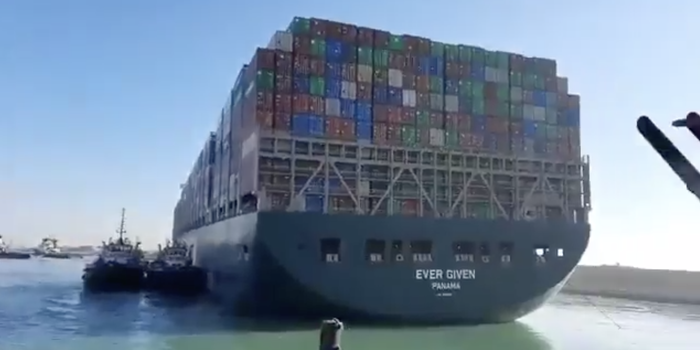
Here's how America could solve a toxic waste crisis in Florida and reduce its dependence on Chinese rare earths and uranium from the former USSR with one weird trick:
bloomberg.com/opinion/articl…
bloomberg.com/opinion/articl…
Residents around Tampa Bay in Florida are facing evacuation orders and a state of emergency after a dam holding radioactive fertilizer waste started leaking, threatening a breach and a 20ft wall of water: nytimes.com/2021/04/04/us/…
Florida and other parts of the southeastern U.S. have for decades been just one big rainstorm away from this sort of environmental crisis, because of more than a billion tons of phosphogypsum stacked up as waste material from the fertilizer industry. 



Although it's pretty similar to the gypsum that's used in plaster and as a soil improver, you can't use this stuff because it also contains trace amounts of uranium and radium, making it too radioactive for everyday use.
However, it also contains something else: rare earths.
However, it also contains something else: rare earths.

You might have heard about rare earths because of concerns about how China dominates the market in these elements, which have a host of critical high-tech applications.
IMO, Beijing's attempts to weaponize the rare earths market have backfired:
bloomberg.com/opinion/articl…
IMO, Beijing's attempts to weaponize the rare earths market have backfired:
bloomberg.com/opinion/articl…
Having said that, some of them are genuinely critical in defense applications, so the U.S. government is right to seek ways to seek alternative sources of supply outside of China:
bloomberg.com/opinion/articl…
bloomberg.com/opinion/articl…
Florida's phosphogypsum offers a great way to kill multiple birds with one stone. It's about 0.2% rare earths, according to a 2017 study. With more than a billion tons of the stuff, that's enough on its own to supply the world's needs for a decade: osti.gov/biblio/1437893
Here's what the U.S. government should be doing. At present, Florida phosphogypsum is radioactive to about 0.4 becquerels per gram, above an EPA limit of 0.37bq/g. If you can get the radioactive elements out of it, though, it's good fertilizer and building material.
There's been dozens of lab experiments laying out ways to do this over the past decade, but none of them have been scaled up to commercial levels because gypsum, uranium and rare earths prices tend to be pretty low.
That's where government needs to step in.
That's where government needs to step in.

Phosphogypsum separation hasn't taken off because it's not very viable for private companies to invest in it. But meanwhile the public sector is spending large sums monitoring and maintaining the waste stacks, while land values and human health are put at risk.
With the Biden administration launching a major infrastructure plan last week including $111 billion for cleaning up the U.S. water supply and replace lead pipes, this is precisely the sort of project that needs a kick from government spending. 

The chemicals in those phosphogypsum piles are worthless all mixed up together, but once separated they're useful.
The gypsum and ammonium sulphate can be sold to the agricultural and construction industries. The rare earths can go into high-tech manufacturing.
The gypsum and ammonium sulphate can be sold to the agricultural and construction industries. The rare earths can go into high-tech manufacturing.
Even the uranium and radium can get used. The former can fuel military and civilian reactors, where America is currently dependent on supplies from Kazakhstan, Russia and Uzbekistan. The latter is useful as medical isotopes, particularly for cutting-edge cancer treatments. 

One of the last acts of the Trump-era EPA was to permit the use of raw phosphogypsum in road construction, a purpose that's been banned for decades. The justification leaned heavily on the fact that the current stacking of this waste is already a problem:
federalregister.gov/documents/2020…
federalregister.gov/documents/2020…
Rather than see the current regulations whittled away in that manner, the U.S. should confront the problem head-on and fund efforts to clear up and separate this waste.
One small side note. The rare earths issue is framed, with justification, in terms of the rising great power competition between the U.S. and China. One terrible side-effect of this tension is a rising wave of anti-Asian attacks and sentiment: nbcnews.com/news/asian-ame…
That manifests not only in the form of physical and verbal assaults on Asian-Americans, but in the form of lower-level prejudice and suspicion of Chinese and Chinese-American scientists and academics:
cen.acs.org/policy/researc…
cen.acs.org/policy/researc…
It's worth remembering that much of what we know about the rare earths potential of phosphogypsum comes from the work of Chinese and Chinese-American researchers.
That paper on Florida rare earths I cited upthread? Its citation is "Liang, Zhang, Jin & DePaoli (2017)".
That paper on Florida rare earths I cited upthread? Its citation is "Liang, Zhang, Jin & DePaoli (2017)".
It's hardly surprising that there's a lot of Chinese expertise in rare earths, given how much the country has dominated supply in recent decades.
But it should be a reminder that if the U.S. wants to be secure against a more aggressive Chinese government, it should be more open and welcoming of Chinese people as researchers and migrants for self-interested as well as moral reasons.
If the U.S. had treated Hungarian Jewish scientists in the 1930s the way it's treating Chinese scientists now, it might never have developed the atomic bomb and won the Cold War arms race. Antiracism isn't just a moral good. It's a great national security strategy, too. (ends)
Usual postscript: Do please read my column for the full story! bloomberg.com/opinion/articl…
• • •
Missing some Tweet in this thread? You can try to
force a refresh










